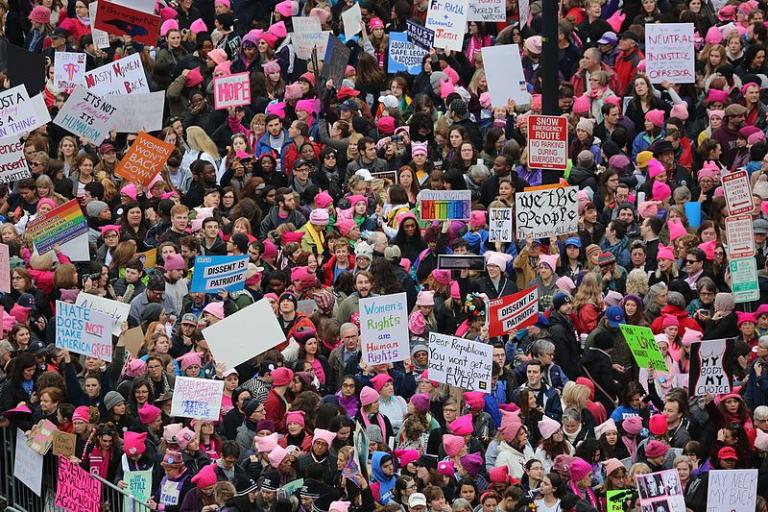Recently I wrote a piece for the National Catholic Reporter, arguing against the idea that Supreme Court nominee Amy Coney Barrett is any kind of feminist hero. Responses to this viewpoint were varied and, at times, vehement. While many readers, especially women readers, agreed strongly with my position that women are not automatically icons of equality simply by virtue of holding power, others accused me of gatekeeping feminism. “Who gets to decide who is and isn’t a feminist?” they asked.
The question posed this way functions as an enthymeme; the implication is that since there is no overarching authority we can’t really make this determination at all. And if we can’t decide who is or isn’t a feminist, anyone can be a feminist. Which means anyone can tack “this is feminist,” onto their argument – and argue that, in opposing them, we are de facto anti-feminist.
Of course this is illogical. And of course the whole thing is predicated on illogic, in an alternative world in which authority trumps reason, and might makes right. In the real world, we should not be worrying about which of us gets to decide. In one sense, all of us do. In another sense, none of us really can. The question should not be about “who gets to decide?” but rather “what principles should we use when we decide?”
When it comes to feminism, there are certain principles at play. And according to these principles, not every woman who assumes a position of influence is a feminist. Not every woman who calls herself a feminist is one, either.
Feminism has never been about women attaining power solely on the individual level. Even less collectivist forms of feminism, such as liberal feminism, strive for equality for women in general, even while emphasizing the importance of individual effort in achieving this goal. Liberal feminists may emphasize the potency of the individual to bring about change within a free and democratic society; this does not mean that liberal feminists point to isolated instances of women’s influence as proof of success.
Women who attain prestige within patriarchy while simultaneously propping up patriarchy are not feminists, for all their individual achievement. Many powerful women, such as Phyllis Schlafly for instance, have used their power to oppose women’s equality. No feminist, however liberal, would laud Schlafly as an icon of feminism.
It is widely recognized that there is no one feminism, but rather many feminisms. Feminists may have different ideas about how or why women are oppressed, and how best to achieve equality. They may have different ideas about what equality entails. But nonetheless there are set principles to which all feminists adhere.
Feminists recognize that oppression of women is a real factor in human history past and present. Feminists do not treat the concept of the patriarchy as a sham, nor minimize patriarchy’s harm, nor defend its structures, nor enable its agents. One can not truthfully claim to be a feminist while simultaneously making excuses for institutions that deny women full equality and representation.
Feminists recognize that the injustices wrought by patriarchal structures demand a response. Whether this response entails voting, marching, activism, protest, education, or personal influence may depend on the capacities and inclinations of the individual; only indifference and passivity in the face of patriarchal injustice are unacceptable. Feminism is as much an activism as it is a belief system. Any woman who claims to be a feminist should have a record to prove it. I discussed, in my NCR piece, Barrett’s failure in this regard, in her history of legal rulings. Not all of us have that kind of influence, of course, but every woman in any sector of society makes choices that have consequences for other women.
If any individual, regardless of gender, claims to be a feminist, consider their actions more closely than you consider their words. Have they advocated for victims? Have they stood up against injustice towards women less privileged than themselves? Have they voted for politicians with a record of supporting women’s equality? Or do they support policies that lead to fewer freedoms and opportunities for women?
Feminists may critique or even oppose certain trends within different feminist movements. Marxist feminists are likely to be at odds with liberal feminists. Black feminists rightly critique the shortcomings of white feminism. But feminists do not set themselves up against the whole collective of feminisms as such. Be wary of anyone, of any gender, who claims to be feminist while opposing every single movement for women’s equality that comes across their radar. Be especially wary when they claim to be the “real feminist” while throwing every other feminist activist under the bus.
I saw this in real time with several self-styled “new feminists” who were loudly critical of the Women’s March. These were Catholic writers and activists who made a career out of posing as feminists, who took fees for speaking as feminists at women’s events, who posture as the true defenders of women’s dignity – but who couldn’t even mobilize with their sisters to protest the broad threat to women’s equality and safety, posed by the Trump regime.
At this point, I have no time for any woman who defends Trump and still claims to be a feminist. I don’t care how loudly anyone asserts their feminism; actions are what matter, and the act of supporting Trump is anti-feminist, anti-woman, sexist, and misogynistic. Trump’s personal acts are sexist and predatory. His public policies are sexist and anti-equality.
Of course, maybe you are white enough, privileged enough, rich enough, so that Trump’s policies don’t affect you directly? Very well. You still don’t get to call yourself a feminist while supporting an administration that has gravely harmed women less privileged than yourself. Women for Trump are not some new edgy kind of feminist. They are just the same old boring yet toxic props of a violent patriarchy.
I am not setting myself up as a gatekeeper of feminism. I am simply keeping fidelity to the fundamental principles on which feminists of all types, at all times, and in all cultures, have acted. It would be an act of stunning disrespect to appropriate the rhetoric of feminism in the service of misogyny, as well as a violation of my own integrity.
Is this gatekeeping? I really don’t care. The gatekeeping we should be worried about is the kind that bars people from equality, protection, and privilege – not the kind intended to keep people safe.
image credit: Womens_March_2017-01_04.jpg













